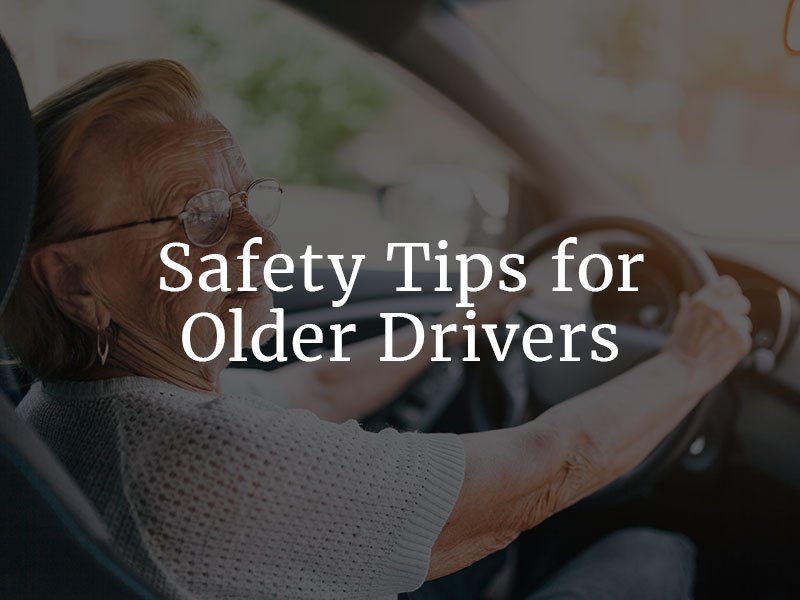Safety Tips for Older Drivers
Most elderly drivers are reluctant to give up their driving privileges. For many, driving is an important way to remain independent in older age. Unfortunately, safely controlling a motor vehicle takes a certain amount of strength, stamina and skill – all of which may decline in old age. The best way to protect yourself or an elderly loved one from car accidents in later years is by keeping a few important safety tips in mind.
Get Regular Vision Checks
Vision often declines in old age. Worsening eyesight, blurred vision or issues such as glaucoma or cataracts could make it impossible to see the road ahead. Vision problems in older age could lead to a driver missing a stop sign, red light or pedestrian. Elderly drivers should schedule eye appointments at least once per year to make sure their vision remains good enough to safely drive and read roadway signs.
Always Wear a Seatbelt
Too many elderly drivers stop wearing their seatbelts – a mistake that could expose them to fatal injuries in collisions. Seatbelts saved almost 15,000 people in 2017, according to data from the National Highway Traffic Safety Administration. Some seniors do not wear seatbelts because they only drive short distances at a time, while others find them uncomfortable or difficult to put on due to physical disabilities. Encourage your elderly loved one to always buckle up.
Avoid Busy Roads
High-traffic highways, roundabouts and intersections could be frightening or confusing for older drivers. Too much happening at once could lead to an older driver making the wrong decision, such as proceeding into an intersection at a red light or failing to yield the right-of-way. Avoiding the busiest roads or driving when there is less traffic could help an elderly driver remain calm and confident behind the wheel.
Be Aware of Dangerous Medications
Drowsy driving is a form of impaired driving that can cause serious and fatal car accidents. No driver should drive tired, regardless of age. Seniors may be more at risk of drowsy driving, however, due to side effects from medications. If you or a loved one is taking any prescription or over-the-counter drugs, read the potential side effects for drowsiness. Take the medication for the first time when you do not have to drive to see how it affects you. Common drugs that can cause fatigue are allergy and cold medications.
Drive During the Day
Nighttime driving can become increasingly difficult for a senior driver with vision problems until it is no longer safe for the person to be on the road after sunset. It could help an older driver avoid an accident by only driving during daylight hours. After dusk, street lights can cause glares on windshields or eyeglasses that may contribute to accidents. It could also become too dark for the driver to see obstacles, fixed objects, vehicles or people.
Exercise Often
Maintaining safe control of a vehicle requires certain physical capabilities. A driver must be able to steer, turn the wheel, push down on the pedals with control, shift gears, look over his or her shoulder and sit comfortably behind the steering wheel. Exercising regularly could help an older person stay in shape enough to make driving safe and easy. Lack of exercise or physical injuries could ultimately force a driver to retire his or her keys in older age.
Limit Driver Distractions
Poor memory, cognitive changes and conditions such as dementia could interfere with the driving ability. If an older driver can still safely operate a motor vehicle, it is his or her responsibility to pay attention to the road. It can be more difficult for an older driver to keep his or her mind on the driving task. Many people lose the ability to multitask in older age. Chatting with passengers, listening to the radio or fiddling with a cellphone could cause a distracted driving accident. If the time comes when the older driver cannot safely control a vehicle, it may be time to give up the driving privilege.

